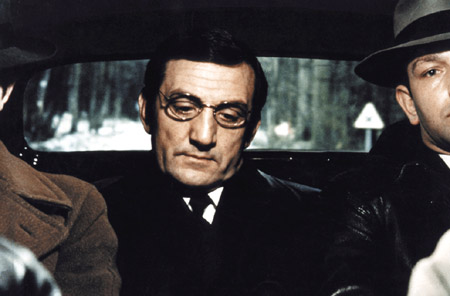

Reviews of Recent Independent, Foreign, & Documentary Films in Theaters and DVD/Home Video
Directed & Written by: Jean-Pierre Melville, based on the novel by Joseph Kessel. Produced by: Jacques Dorfmann. Director of Photography: Pierre Lhomme. Edited by: Françoise Bonnot. Music by: Eric de Marsan. Released by: Rialto. Language: French with English subtitles. Country of Origin: France/Italy. 145 min. Not Rated. With: Lino Ventura, Simone Signoret, Paul Meurisse, Jean-Pierre Cassel, Claude Mann, Paul Crauchet, Christian Barbier & Serge Reggiani. Strangely, Jean-Pierre Melville’s engrossing French resistance drama is only now premiering in the US. This all-star drama was originally released in 1969, the same year Marcel Ophüls made his groundbreaking documentary, The Sorrow and the Pity, the scathing reexamination of the French during the Nazi occupation. (France was the only occupied nation whose government collaborated with the Germans). Drawing on his own two years in the Resistance, Melville’s film follows a tight-knit group’s uphill struggle against the occupiers. With a slower pace than its American counterparts, the tone from the outset is somber, quite the opposite to the more melodramatic WW II Hollywood fare like The Great Escape (1963), and more intimate in scale than the epics The Longest Day (1962) or the 1970 bloated take on the Day of Infamy, Tora! Tora! Tora!, though the aerial footage in Melville's film is not quite in the same league. Filmed in an icy blue palette, the sun rarely shines save for an interlude in Marseilles. (The print has been beautifully restored, supervised by its cinematographer Pierre Lhomme.)
Melville milks the tension for all its worth as ringleader Philippe Gerbier (Lino Ventura) hesitates before parachuting out of a plane for the first time or while he waits for the right moment to escape from German custody. But overall the emotional tone is reserved due mainly to the understated performances, although each chapter of this episodic saga builds to its own whooping climax. Fans of Melville’s Le Samouraï will recognize the pessimistic foreshadowing almost immediately. As austere as Le Samouraï, Army of Shadows is less of a rousing tribute than it is a moral meditation.
Kent Turner
|